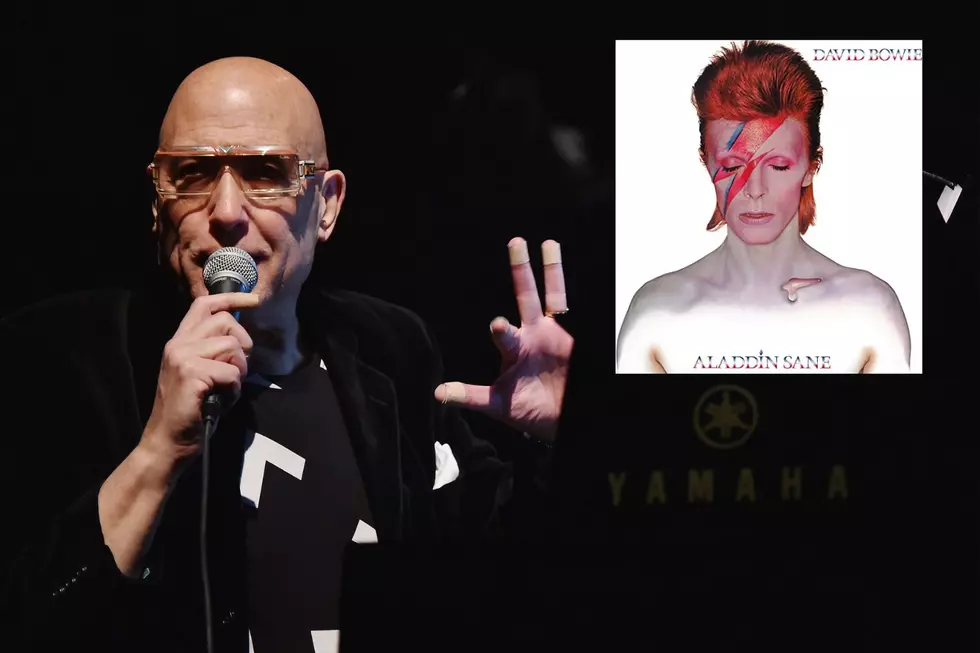
Inside David Bowie’s Freewheeling Sessions for ‘Aladdin Sane': Exclusive Interview
Pianist Mike Garson auditioned for David Bowie in 1972. He landed the job, joined the Spiders From Mars and immediately hit the road, realizing the adventure he'd unwittingly signed up for in real-time.
A classical and jazz pianist by training, Garson brought something new to the table. Bowie was riding high with Ziggy Stardust and the Spiders From Mars, but aimed to push further since he was never one to rest on his laurels. Garson seemed to hold the key to something more experimental, more avant-garde.
Bowie's sixth album, Aladdin Sane, was released on April 20, 1973, though it was made available on April 19 in advance of a U.K. state holiday. Aladdin Sane marked a new era for Bowie with its eccentric piano solos and risque writing. Looking back, Garson believes that he and Bowie were "telepathic" on some level, with Garson offering Bowie sounds he'd never been able to utilize before, and Bowie allowing Garson free reign to try what he wished in the studio. Aladdin Sane was another major success, reaching No. 1 on the U.K. albums chart and going on to become one of Bowie's most beloved releases.
But Garson knows all too well that not everyone gets to see the fruits of their labor decades on. "I should be dead," he tells UCR, "and I'm still here to tell the story."
Garson spoke with UCR for the 50th anniversary of Aladdin Sane.
Bowie was writing a lot of the material that would eventually end up on Aladdin Sane while touring the U.S. in '72 and '73. He was pretty fascinated with America in general, and that came through in his writing, but, interestingly, you were the only American in his band.
I was the ugly American. ... I'll never forget, when we had these dinners after shows, he would sit next to me and he would — kind of like what you're doing — he would interview me and want to know about the New York scene, what I did in jazz, what was going on, what was going on in the avant-garde scene in New York and all that. He was an absolute sponge, and he was very much in listening mode and learning mode. He really loved America because Little Richard and Elvis Presley and people like that were his influences — same as for Mick Jagger. So they were like chameleons, and he would just absorb at a rate that was frightening, actually.
It's easy to look back now and see how groundbreaking Aladdin Sane is, but did it feel that way at the time?
In the moment, I knew what I was playing wasn't typical rock 'n' roll. My training wasn't in rock 'n' roll; it was in jazz and classical. But I was just playing what I was hearing, in my — let's say, inner ear — what I felt would support this music that he was creating. ... I almost played the piano how David would have played the piano if he could have played the piano as well as me. So I played those parts on "Aladdin Sane" and "Time" and "Lady Grinning Soul" and "Let's Spend the Night Together" as how I thought he might have played it if he was me.
Did you ever say that to him or is that something you've considered in hindsight?
It was in hindsight. I think when I just said that to you, I think he heard it and smiled.
Listen to David Bowie's 'Aladdin Sane'
How do you recall the atmosphere of the Aladdin Sane sessions?
Very relaxed. ... The atmosphere in Trident Studio [in London], you could feel that David was excited to do something new. He was already done with Ziggy. We were still gonna do another six months of touring, but he was gonna be done with it at that concert at [the] Hammersmith [Odeon Theatre, in London] in July '73. It was all over. ... David was like a spirit that had to keep moving at a rate that was faster than us normal people work. We could have stood another six months to a year of Ziggy, could have stood another year of Diamond Dogs, another year of Young Americans, it was always that way — but his desire to, like, push forward and keep going was more important to him than the commercialness of milking it a little more like most bands do. And that requires a lot of integrity. That's one thing David had connected with his art: He was very uncompromising.
But at the same time, it appears he was pretty open to what other people could produce in the studio. The piano part in "Time," for example — as I understand it, Bowie asked you to play some kind of early-1900s style piano, and that's what you came up with.
You mean this one? [Plays piano riff.] That was one take. That was right in my wheelbarrow of what skills I had. All he had to do was tell me "1920s." They called it stride piano at the time ... and he said, "Can you play it that style?" He didn't know the word stride, but he said, "Could you play like those guys in the '20s? But twist it a little bit? Make it a little avant-garde?" And it was a no-brainer for me.
Listen to David Bowie's 'Time'
What about the cover of the Rolling Stones' "Let's Spend the Night Together"? Do you know why Bowie picked that song in particular?
I don't know what he was thinking about at all. What I do know is I was sort of tongue in cheek and just messing around in the studio and I did this crazy thing. And they thought it was the greatest thing since like, you know, the wheel was invented. To me, I was just joking around, but the tape was running, and they kept it!
What was the most challenging part about making Aladdin Sane?
There was nothing challenging. It was the easiest album I've ever done. I did the whole album – I was living in England at the time, 35 miles I think from the studio, maybe 40. And I would take the train in. ... I just showed up for three, four hours, three different times. That was it.
Is there a song from the album that you view most differently now, 50 years later?
Well, the one regret I had is we never did "Lady Grinning Soul" live in the 600 concerts I did.
That song ties the album up nicely at the end.
I was in a really good headspace for that album. ... I think David was excited to use my piano skills because he had explored the depth of guitar on Ziggy with Mick [Ronson]. It doesn't get any better than that album, but he now wanted me to be the soloist. The guitar is there, obviously, but the piano is the feature – and what a bold move by David. And being a little naive and not a rock musician, I just went in and played what I might have played on anyone's albums if fate let me. But the key word was "let me." He was willing to let me do anything I wanted, whereas most producers and singers, you know, they want to keep you playing just something very simple and supportive. He was looking for something that was so over the top, and I was somehow able to give it to him, and that's the mystery to me.
Do you think Aladdin Sane has stood the test of time?
It really has. It's in his top three albums as far as I'm concerned. ... It's a little more esoteric, and a little harder to digest because of my playing, but you know what? Fifty years later, the playing on "Lady Grinning Soul" and "Aladdin Sane" and "Time," could have been done today. It's as fresh as it was then.
Listen to David Bowie's 'Lady Grinning Soul'
Albums Released Under Different Names
Why David Bowie Was Drawn to Collaborate With John Lennon

